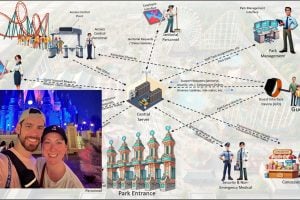
After nearly a decade working in autonomous vehicle systems for both commercial and defense applications, one Johns Hopkins Engineering for Professionals (EP) student took on a very different complex system: the modern theme park.
Drawing inspiration from a family trip to Disney World and leveraging years of experience in systems, integration, and safety engineering, Ben Quigley developed the Interactive Theme Park Experience System (ITPES) —a concept aimed at transforming how parks manage guest experiences and internal operations.
“The idea was to create a modular, extensible architecture that is smarter, more intuitive, and adaptable for different parks, regardless of brand or size,” said Quigley, a staff safety engineer at Forterra, who completed his master’s in systems engineering in December.
ITPES seeks to streamline park operations through a mobile/wearable system for real-time guest requests and staff allocation. Guests report issues—like a lost item or a medical concern—via an app or wearable, with the system automatically locating them and dispatching the nearest qualified staff member. Meanwhile, real-time data on ride and queue statuses informs automated adjustments, such as redirecting guests standing on line to reduce wait times and improve ride efficiency. The system also updates personal itineraries based on guest preferences and location, while guests can track response progress and managers monitor performance metrics to ensure operational efficiency.
At the core of the project is a structured engineering approach (Model-Based Systems Engineering), using specialized diagrams and notation (Systems Modeling Language or SysML) to track connections between all the project elements—from stakeholder needs to design concepts and functions, ensuring that nothing gets lost or disconnected through development.
“One of the biggest challenges was designing a system that could support diverse functions while staying loosely coupled and adaptable to different park configurations,” Quigley said. “MBSE let me break the system into clear components while ensuring they worked together seamlessly.”
Faculty guidance was key. Quigley credits advisor Jeff Bobrow for offering valuable feedback while allowing him to lead the project.
He said that the project challenged him to bring together everything he had learned—both on the job and in the classroom—and drew heavily on core systems engineering skills like requirements analysis, functional decomposition, risk management, and Earned Value Management (EVM).
“Completing this project has made me more confident in tackling complex system designs and taking on leadership roles that blend technical and managerial responsibilities,” Quigley said.
While Quigley isn’t planning to compete with Disney anytime soon, the experience sparked ideas about how modular, scalable system architectures can benefit industries from transportation to public safety.
He strongly recommends the Systems Engineering program.
“The faculty brings real-world experience, the curriculum is challenging and relevant, and the flexibility of the online format makes it manageable for working professionals.”